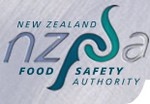Hand washing can save lives
Soap is a top weapon in the war against infectious diseases – that’s the key message of Global Handwashing Day, today.
The New Zealand Food Safety Authority (NZFSA) has long promoted hand washing as the most effective action people can take to prevent the spread of infectious diseases. Thorough hand hygiene not only protects the individual but also those around them.
“Hand hygiene is critical to food safety,” says Dr Donald Campbell, NZFSA’s Principal Advisor (Public Health). “Safe food relies on cooks having clean hands because food is a fertile ground for bacteria, and numbers can double in very short times. With poor hand hygiene it’s very easy to unknowingly infect large numbers of people.”
Global Handwashing Day – 15 October – is part of the UN International Year of Sanitation, and calls for improved hygiene practices worldwide. The UN points out that although people around the world wash their hands with water, very few wash with soap at the critical occasions. The World Health Organisation (WHO) claims that simple hand washing with soap could reduce by half the estimated two million child deaths caused by diarrhoea every year.
A survey of hand washing habits conducted by the Auckland Regional Public Health Service for NZFSA’s Foodsafe Partnership late last year showed that Kiwis are just as guilty of poor hand washing. Auckland Medical Officer of Health, Dr Greg Simmons, who helped organise the survey, commented at the time: “The hand washing habits of the New Zealand public appear to leave much to be desired: 13.3% of those observed did not practise any form of hand hygiene at all after going to the toilet.”
For Global Handwashing Day NZFSA is endorsing the 20+20 rule: wash hands for 20 seconds with soap and hot water and dry for 20 seconds with a clean, dry towel or paper towel.
The message will be further emphasised in the Foodsafe Partnership’s upcoming Foodsafe Week, from 10th to 16th November (visit www.foodsafe.org.nz).
